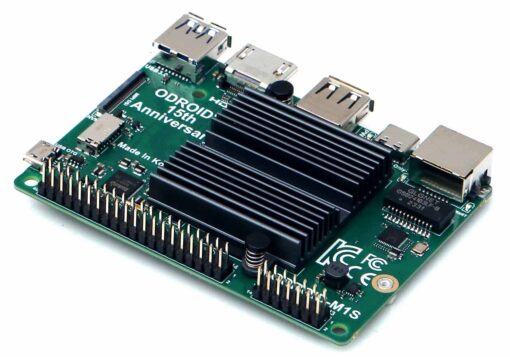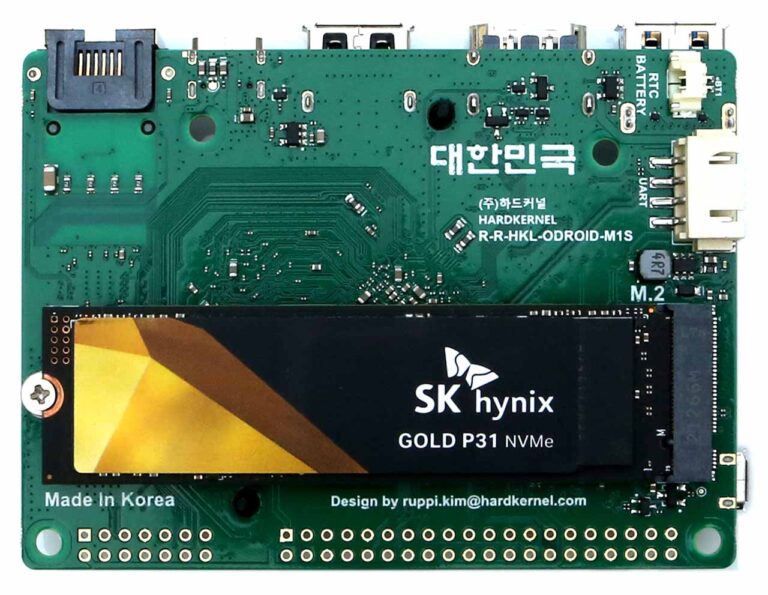ODROID-M1S with IO Header
Deliveries:
South Africa: Price: R115, 2-4 working days.
International: Contact us for a quote.
Collections:
No Charge - 3 Appian Place, 373 Kent Ave, Randburg Effortlessly bridge legacy and modern technologies with our DB9 to USB Connector, enabling seamless connectivity between serial devices and USB ports.
All items subject to manufacturer's warranty. Extended 12 month warranty available at 20% of purchase price. t&c apply
ODROID M1S + IO Header
Reduced power consumption and slimmer form factor
The innovative approach involved leveraging 3D modeling from the early PCB design stages, facilitating precise and rapid case development. The collaborative efforts between circuit design and mechanical design were remarkably smooth, making this project a memorable development in the realm of novel and efficient product creation.
The M1S features the RK3566 System-on-Chip (SOC), a sibling of the RK3568 found in the original M1. This design enables the reuse of a significant portion of software development. While the bootloader and kernel settings differ, it's not possible to use existing M1 OS images directly. However, a straightforward porting process facilitates quick adaptation.
Accessories:
oDroid 4-Channel Relay Board ofr M1S
Specifications:
| Form Factor | Board Dimensions: 90mm x 65mm x 16mm Weight: 52g including heatsink |
| Processor | Rockchip RK3566 Processor L1 instruction cache: 32 KB, 4-way set associative (128 sets), 64 byte lines, shared by 1 processor L1 data cache: 32 KB, 4-way set associative (128 sets), 64 byte lines, shared by 1 processor L3 data cache: 512KB , 16-way set associative (512 sets), 64 byte lines, shared by 4 processorsQuad-Core Cortex-A55 (1.8GHz) ARMv8-A architecture with Neon and Crypto extensions Mali-G52 GPU with 2 x Execution Engines (800Mhz) |
| NPU |
0.8 TOPS@INT8, Integrated AI accelerator RKNN NPU Supports one-click switching of Caffe/TensorFlow/TFLite/ONNX/PyTorch/Keras/Darknet |
| Memory | LPDDR4 4 or 8GiB with 32-bit bus width, Data rate: 2112 MT/s, up to 1,055MHz |
| Storage | 1 x 64GB eMMC embedded (soldered to the PCB) 1 x Micro SD slot (UHS-I SDR104, Boot priority is always higher than eMMC) 1 x NVME M.2 SSD (PCIe 2.1 x 1 lane) |
| Networking | 1 x GbE LAN ports (RJ45, supports 10/100/1000 Mbps) – Realtek RTL8211F Ethernet transceiver – LED indicators * Green LED: Flashing by data traffics at 100Mbps connection * Amber LED: Flashing by data traffics at 1000Mbps connection |
| Video | 1 x HDMI 2.0 (up to 4K@60Hz with HDR, EDID) 1 x MIPI DSI Interface (30pin connector which is different from 31pin of the original ODROID-M1) |
| External I/O | 1 x USB 2.0 host port 1 x USB 3.0 host port 1 x USB 2.0 micro OTG port 1 x Debug serial console (UART) 1 x 40 pin GPIO and 1 x 14 pin GPIO |
| Other features | RTC backup battery connector (to keep time and date for several months without main power input) System LED Indicators: – Red (POWER) – Solid light when DC power is connected – Blue (ALIVE) – Flashing like heartbeat while Kernel is running. Solid On in the u-boot stage. |
Power
| 1 x USB Type C for Power only DC input : 4.9V ~ 5.3V – USB Type C 5V/3A power adapter is recommended – IDLE : ≃ 1.1W – CPU Stress : ≃ 3.52W (Performance governor) – Power Off : ≃ 0W |
| Rockchip RK3566 CPU | 1 x MIPI DSI 4Lane |
| LPDDR4 RAM | 1 x M.2 LED Indicator |
| 1 x 64GB eMMC embedded | 1 x Micro SD Slot |
| 1 x Ethernet Transformer | 1 x Micro USB2.0 OTG |
| 1 x RJ45 Ethernet Port (10/100/1000) | 1 x Micro USB2.0 OTG |
| 1 x USB Type C Power Connector | 40 x GPIO Pins Optional |
| 1 x USB 2.0 | 14 x GPIO Pins Optional |
| 1 x HDMI 2.0 | 1 x RTC Backup Battery Connector |
| 1 x USB 3.0 | 1 x UART for System Console |
| 1 x M.2. M-KEY PCIe2.1 1Lane |
Breaking away from the traditional ODROID board series, the ODROID-M1S features on-board eMMC storage with a soldered chip directly onto the PCB. This departure from removable eMMC modules ensures a default 64GB capacity, deemed adequate for the majority of embedded system applications. Notably, the eMMC speed, as measured by the fio command, reaches approximately 180MiB/s, showcasing a 3~5 times improvement compared to typical microSD cards.
Expanded Storage Options:
Should the 64GB on-board eMMC storage prove insufficient, the ODROID-M1S offers a versatile solution with its on-board M.2 NVMe slot. Supporting the industry-standard 2280 form factor NVMe SSDs, this slot facilitates access to extensive data storage capacities. While the M1S adopts a PCIe 2.1 x 1 lane configuration, as opposed to the original M1 model's PCIe 3.0 x 2 lanes, the NVMe transfer speed is still robust, albeit reduced by approximately 1/4. With an anticipated storage access speed of ~400 MiB/s, we are confident that this meets the demands of various high-end embedded systems. It's important to note that the M.2 slot exclusively supports PCIe interface (M-Key) devices, and M.2 SATA storage devices are not compatible.
Specifications for ODROID-M1S with IO Header
| RAM/Memory | 8GB or 4GB |
|
RAM/Memory |
8GB , 4GB |








